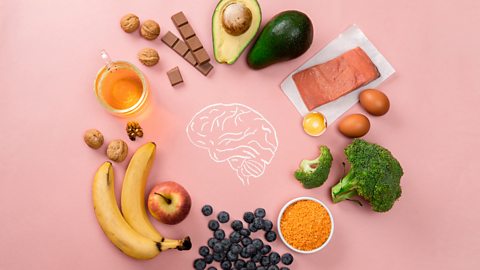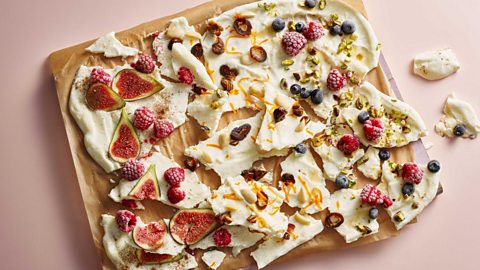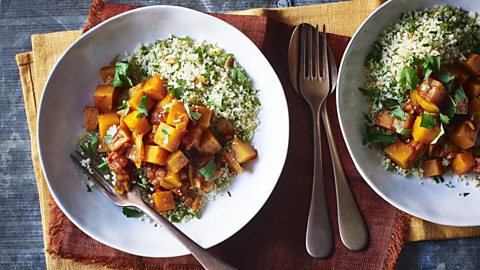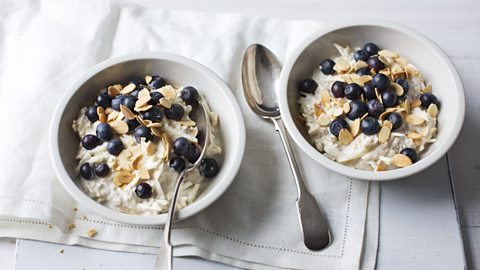Can some foods really improve your memory?
Memory can be impacted by everything from sleep to stress, but have you heard the claims that specific foods might also play a role? We take a look at the science behind these claims.
By Lauren Potts

It’s a familiar picture: we stride with purpose into a room only to stop dead, wondering what we went in for. And we’ve all mislaid our keys, turning the house upside down before spotting them in the obvious place. Sometimes it can feel like our short-term memory has more in common with our kitchen sieve than we’d like. But might there be key ingredients – or even whole diets – that could help make these moments of forgetfulness a thing of the past?
What causes forgetfulness?
There are lots of things that can affect our memory, but perhaps none more so than a lack of rest and excess stress, says Rebecca McManamon, registered dietitian and spokesperson for the British Dietetics Association.
“Tiredness and poor sleep can be a huge factor, while stress and getting to the point of burnout can certainly precipitate those occasional moments of forgetfulness.
“It’s normal, when we’ve got busy lives, to not remember everything we’ve done in our day, or forget to do everything we intended. It’s when the forgetfulness becomes more frequent that it might need to be investigated.”
There are several conditions that can increase forgetfulness or impact memory function too, adds fellow dietician Claire Lynch, from Plant-Based Health Professionals.
“It becomes concerning when you’re aware you’re forgetting things way more than you normally do. That’s likely to happen when you approach an older age (when slight cognitive decline is normal), during menopause, which can cause temporary brain fog and forgetfulness, and when you have depression or anxiety. Those circumstances make you more likely to be forgetful.”
For those with no underlying health issues, however, there are ways we can tweak our diets to help keep our memory sharp.
Cut back on fat and sugar
Eating for your memory isn’t so much about which ingredients could improve your recall, but the nutrients that support overall brain health, says Lynch.
She explains that eating inflammatory foods can cause on the body’s vascular system (the system that carries blood around your body), which could lead to conditions like type 2 diabetes, weight gain, high blood pressure and high cholesterol. This can have knock-on effects on what’s happening inside your head.
“Anything affecting your vascular health is going to affect your brain health because it’s a very vascularised organ,” she says. In other words, it’s very reliant on healthy blood circulation.
“All the things that cause vascular dysfunction are foods that tend to be inflammatory: highly processed foods, sugary refined carbs, animal products and saturated fat.”
Yoghurt bark
Have a craving for something sweet? When it comes to refined sugars, this entire bark contains just one tablespoon of honey

Both Lynch and McManamon highlighted studies – and – that suggested a higher intake of saturated fat was significantly associated with an increased risk of Alzheimer’s and dementia, conditions synonymous with memory loss.
Refined sugars, meanwhile, have also been shown to impair cognitive health both in the and .
Power plants
If you’re after an overall diet concept to help keep your mind healthy, McManamon recommends , which is a combination of the Mediterranean and diets that has been shown to .
“When we think about a Mediterranean diet, we think about having a range of vegetables, lots of fruits, oily fish and olive oil,” she says. “Where MIND starts to differ is [in its focus on] reducing blood pressure, so thinking about having a variety of wholegrains in our diet like buckwheat and quinoa, limiting saturated fats and [incorporating sources of] omega-3 like mackerel or fresh salmon or [plain, unsalted] nuts like walnuts.”
With salmon, greens and seeds, could this dish help support good heart health?
Omega-3 is an essential fatty acid that has long been studied for its potentially positive impact on brain health, but the evidence is mixed, says Dr Daniel Lamport, an associate professor in biological psychology at the University of Reading.
“Over the years, researchers have been interested in the possible benefits to long-term brain health, primarily because the brain contains a large quantity of omega-3. A indicated that individuals consuming higher amounts of omega-3 are less likely to develop cognitive impairment,” he says.
“However, that’s certainly not set in stone and some academics disagree that there’s clear evidence that omega-3 can improve cognition or reduce risk of neurodegenerative diseases.”
There is, however, a “good body of evidence” to suggest that eating plants, fruits and vegetables can boost cognitive performance and memory because of their high concentration of polyphenols – a type of phytonutrient that gives foods their colour.
Lynch recommends eating a diet high in phytonutrients. Two particular types have given especially promising results in studies, she says: flavonoids (found in apples, grapes, berries and black tea) which have been shown to , and carotenoids (found in yellow, orange and green vegetables), which may .
Butternut squash tagine with couscous
Butternut squash is rich in carotenoids, which are thought to be positive for brain health

“They reduce inflammation and oxidation, meaning they’re good for your vascular health,” she says. “It’s this which benefits your brain health and in turn your memory and cognition.”
Lamport, whose research interests include the effect of diet, nutrition and metabolic disorders on cognitive function, in which participants were given memory tests before and after eating polyphenols, with a particular focus on blueberries.
“Blueberries are perhaps one of the most widely studied polyphenol-rich fruits, with evidence to support acute benefits for memory in children, healthy adults and adults with mild cognitive impairment,” he says. “Typically, what we see is that blueberries and other polyphenol-rich foods can improve performance in terms of being able to recall .
“You could argue that the evidence of recalling one to two more words or items from a list is akin to forgetting less of the food items on the list when you go shopping, or not forgetting to do that final thing in your day you planned to do, like collect that letter from the post office.”
Overnight oats
Prepare this easy breakfast before you go to bed and simply top it with blueberries and almonds in the morning

Follow the science
Less proven are claims made about coffee, which also contains polyphenols. Though it’s known to increase some cognitive functions such as memory soon after consumption, there isn’t enough high-quality evidence to be definitive, and caffeine itself is a known strong stimulant that increases reaction time, says Lamport. However, a study by one of his PhD students is exploring whether the type of coffee consumed makes a difference.
“We think that coffee which is especially high in a particular polyphenol called chlorogenic acid (CGA) is most likely to be beneficial to cognition,” he explains. “Typically, coffees which are higher quality are higher in CGA, while freeze-dried instant varieties are likely to contain much less and therefore are unlikely to have polyphenol-related benefits.”
Meanwhile, a different kind of bean may give those with a sweet tooth reason to rejoice. Yes, there is some weight to the idea that . Cocoa beans are high in flavonoids but, much like coffee, it comes down to the quality, cautions Lamport.
“There is a strong evidence base for chocolate that is high in cocoa – dark chocolate – being beneficial for cognitive health. Having said that, chocolate is often processed to include a lot of sugar, which we know is bad for health.”
Get the right balance
Though (sadly) no one is recommending a diet of chocolate and flat whites as a shortcut to good brain health, there are some easy ways we can adapt our eating habits to help improve memory. One is to ensure we get the right balance of vitamins, as some common deficiencies can present as memory problems.
Low levels of vitamin D, for example, have been linked but also , says McManamon, recommending people in the UK follow and consider taking a supplement in the winter months when we get less of it from the sun.
“I’ve known patients that, within a month of correcting their vitamin D deficiency, have reported that they’re sharper, can focus and have a better memory.”
Meanwhile, anyone who isn’t consuming enough vitamin B12 – which can be common among those following a vegan diet – should look for ways to increase it, whether that’s through fortified foods or, if your GP advises, .
“You often get older adults that think they might be getting dementia then they go to the doctor and it’s often that they’re low in vitamin B12,” adds Lynch. “Then they have [vitamin] injections and they can improve a lot.”
But the number one thing we can do to improve our memory is incorporate foods into our diet that are proven to have multiple advantages, with the bonus of benefitting our minds, she says.
“Green leafy vegetables, wholegrains, berries, seeds and nuts are the foods to focus on. In terms of good brain health, these foods are going to affect your overall cognition – of which your memory is a key part.”
Originally published November 2023